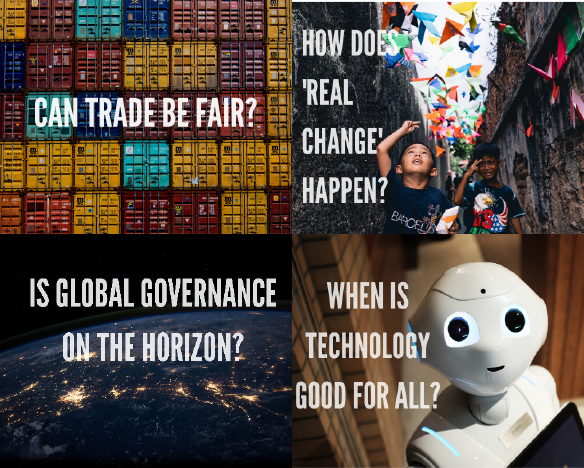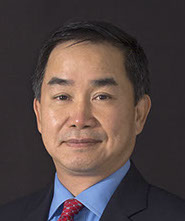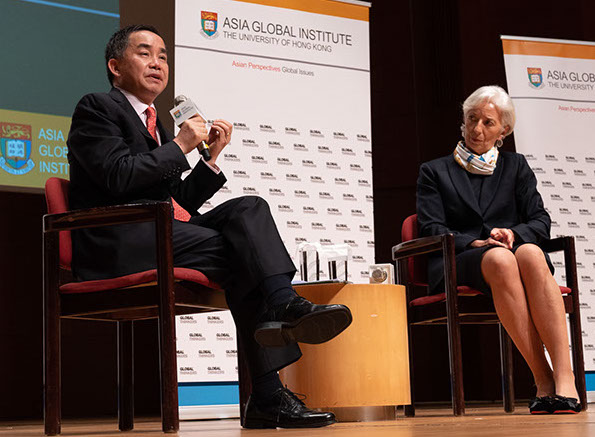_01.png?crc=4174553115)
Cover Story
Research
People
Books
Archive
Download PDF
Download PDF
E-book version
Teaching
and Learning
Knowledge
Exchange
Brexit, the Trump presidency and the looming threat of trade wars have cast a dark and gloomy shadow over globalisation, which is being blamed for rising inequality, ‘unwanted’ immigrants and social disruption. Much of the overly negative public discourse on the topic, however, has been dominated by Western perspectives – even as Asia is becoming the pivot of global transformation.
Enter the Asia Global Institute (AGI) at HKU, which is bringing essential Asian perspectives to global discourses on such critically-important phenomena as globalisation.
Professor Chen Zhiwu, Victor and William Fung Professor in Economics and Director of the AGI,said the Institute aims to provide a platform for scholars and others in the region to speak up more. “A lot of voices and perspectives have been coming from the US and Western Europe. Asian scholars and players have not contributed too much to the discussion,” he said, which he attributed to the dominance of the English language and the more reticent traditions of Asian cultures with regard to public discourse.
It has also been too easy to focus on the negative side of globalisation. “Most people can relate to the obvious consequences of globalisation, but the more subtle and intangible benefits can be easily ignored; we take globalisation as a given and we don’t connect it with how we live our lives,” he said. “With its unique legacy, Hong Kong is a special place for such debates. It is also a hub with expats from around the world living and working here. Without globalisation, there would not be Hong Kong.”
In January, 2018, the Institute launched the AsiaGlobal Online Journal, a platform on which scholars, professionals, civil society leaders and others especially from Asia are invited to write on a range of topical issues. The journal publishes two short and thoughtful original pieces every week. Nobel Laureate Michael Spence, who is AGI’s Advisory Board Co-Chair, inaugurated the journal with an article on inequality and social stability. Other writers include Xu Guoqi, Kerry Group Professor in Globalisation History in the AGI, who reflected on the significance of sports diplomacy, such as the Olympic Games in South Korea and the implications on the South-North Korea relationship.
Dr Séverine Arsène, Managing Editor of the journal, said the AsiaGlobal Online team helps authors keep the articles short and jargon-free so they are accessible to a wider audience interested in global issues. “We’re trying to provide more space for different points of view. We also want to demonstrate what HKU can do in terms of putting forward interesting and thought-provoking ideas.”
Capacity-building is also on the agenda
In addition to the digital platform, AGI convenes regular dialogues and events to exchange ideas. Its annual flagship conference, the Asia-Global Dialogue, features high-powered speakers from government, academia, international institutions and businesses.
Another major initiative of the AGI is the AsiaGlobal Fellowship programme, the mission of which is to cultivate future leaders and influencers with a deep understanding of global issues from Asian perspectives. The interdisciplinary and intensive leadership programme is developed for mid-career professionals from around the world. The first cohort consisted of 15 fellows from 14 countries who spent three months at HKU and other parts of Asia in 2017.
Professor Chen said the Institute is also launching three research programmes on topics where they think HKU can provide strong expertise: policy issues related to the Quadrilateral Security Dialogue between the US, Japan, Australia and India, to which the Institute has added China (the ‘Quad + 1’); religion and globalisation; and FinTech policy. He hopes these research efforts, like the other work of AGI, will have impact beyond academia.
“Whatever we do, I want us to have a clear and direct impact on the larger society. We don’t just want to write white papers for our own private consumption. If anything, we are more interested in influencing larger societal thinking on global issues and globalisation,” he said.
The Asia Global Institute (www.asiaglobalinstitute.hku.hk) was inaugurated on July 1, 2015 with
a generous endowment from the Victor and William Fung Foundation. Its mission is to generate
and disseminate innovative thinking and policy- relevant research on global issues from
Asian perspectives.
Subscribe to the AsiaGlobal Online Journal at www.asiaglobalonline.hku.hk/
Madame Christine Lagarde (right), Managing Director of International Monetary Fund, was invited to deliver a keynote address in the Global Thinkers event in April, 2018.

A BALANCE TO
THE BACKLASH
AsiaGlobal Online, launched in January, 2018 by the Asia Global Institute, aims to offer much-needed policy-relevant insights on global issues from Asian perspectives.

![]() We don’t just want to write white papers
We don’t just want to write white papers
for our own private consumption. If anything, we are more interested in influencing larger societal thinking on global issues and globalisation. ![]()
Professor Chen Zhiwu
Back
Next

_12.png?crc=4068918582)